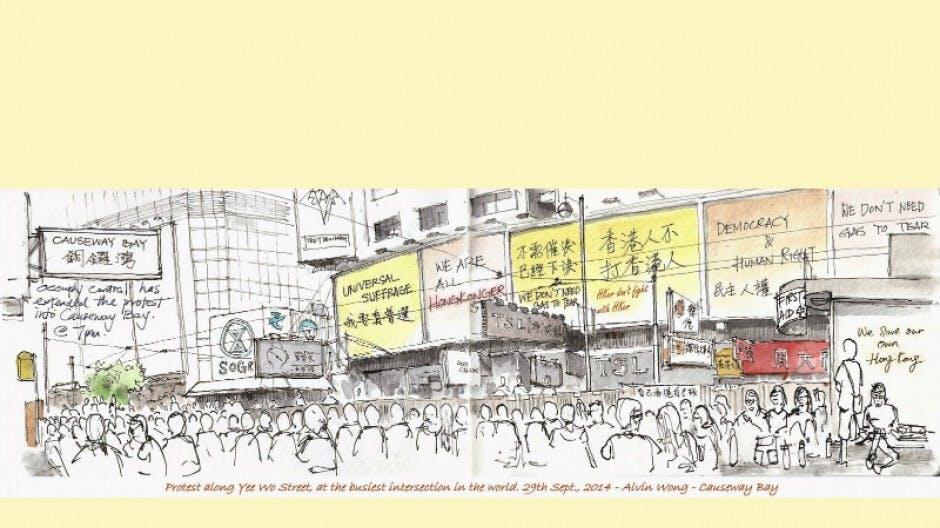以下是我應好友黃啟聰(Alvin)之邀,為一本即將出版的畫冊(《傘下速寫 》 Sketches under Umbrellas,其中包括了眾多本地 Urban Sketchers——包括 Alvin本人——的作品)所寫的英文序言:
Whenever the name “Hong Kong” comes up, most people would think of a bustling metropolis noted for its dazzling speed of doing business as well as almost everything. The people of Hong Kong are famous for their flexibility, adaptability and the readiness to make a quick buck, rather than their keenness in politics and social affairs. Actually, having lived under colonial rule for one and a half century, Hong Kong people are well-known pragmatists who have learnt to stay away from politics as far as possible.
79 days: a fight for genuine universal suffrage
So it comes as a great surprise to people around the world, and as a matter of fact even to many people of Hong Kong, when tens of thousands of people dared to defy the law (and braced the attack of tear gas), and occupied key roads outside the Central Governments Offices, which are close to the city’s central business district. This was quickly followed by similar occupations in Causeway Bay, a key commercial area also on Hong Kong Island side, and then Mongkok, another vital commercial district on Kowloon side, leading to complete block-off of traffic in those areas. And this not just for a few days, but for a full 79 days!
And the reason? To fight for genuine universal suffrage, which was promised by the Beijing government since the sovereignty of the city was handed back by the British to the Chinese in 1997. The history of this betrayal and struggle suffices to fill volumes, and volumes have actually been written. To this author, what is amazing is not just the courage and perseverance of the occupiers, but the level of discipline and the spirit of solidarity and communitarianism manifested during the occupation period. Throughout the 79 days, not even a single car was overturned, a single tyre burnt nor a single display window glass broken. And during my numerous visits to the sites, the sense of comradeship was palpable and touching, with young people (some barely in their teens) helping to distribute food, water, medical supplies while collecting each and every bit of garbage to ensure that the occupied areas remain spotlessly clean. More than one friend have echoed my feelings after visiting the occupied areas: “Are we seeing utopia on earth?”
An extended citizen activism needed
Seeing all these, a thought that occurred to me early on is “Is this what the Paris Commune of 1871 looked like?” Well, you would be hard put to find a person in Hong Kong who knows what the Paris Commune is, but the logic of history drives people toward the same direction. Seeing this as an opportunity too good to lose, I wrote three open letters to the leaders of the movement, and conducted a total of five open-air talks to the occupiers. My thesis is that this heroic surge of citizen activism must not confine itself to a fight against the authoritarianism of Beijing, but must extend itself – at least in thought if not in specific action – to encompass the fight against the grave social and global injustice brought about by rampant capitalism and the exploitative neocolonial world order. So at a fundamental level, the Occupy Central movement in Hong Kong and the Occupy Wall Street movement in New York are one and the same movement. Furthermore, in my book on the climate crisis published in 2011, I said “If we lose in our fight against global warming, we lose in everything we are fighting for.” And the greatest obstruction to our fight against global warming is exactly the logic of corporatism and capitalistic expansion.
While historians will continue to spill tons of ink on his epochal event, a group of artists in Hong Kong have borne witness to this using their inks in a somewhat different way. These are the Urban Sketchers, selected works of whom form the book which you are now holding. In this day and age of ubiquitous and instant video-recording, one may question the need of using paint and easel to record the march of events. Yet after looking at the sketches in this book, I am sure you would appreciate the unique value of these testimonies. They are not just the products of artistic skills. They are perspectives and tributes to the indefatigable human spirit portrayed through the hands, mind and heart of human beings with artistic sensibilities. For the cliché that Hong Kong is a “cultural desert”, this album is the most eloquent refutation.
“The fight has just begun”
It is true that the movement ended without achieving its objectives, hence many participants are deeply disillusioned. And yet from a long-term historical perspective, this should only be seen as a set-back and not a complete failure. The fight for democracy and social justice is a long and arduous journey, and what had happened in the autumn of 2014 is already a milestone in the annals of Hong Kong’s history, a “sparkle in the great blue motion of the sunlit sea”. To all the young participants, and the younger generations to come, I have this to say: “The fight has just begun!”
LEE Wai-choi, Eddy.
2 June 2015




.jpg)
































